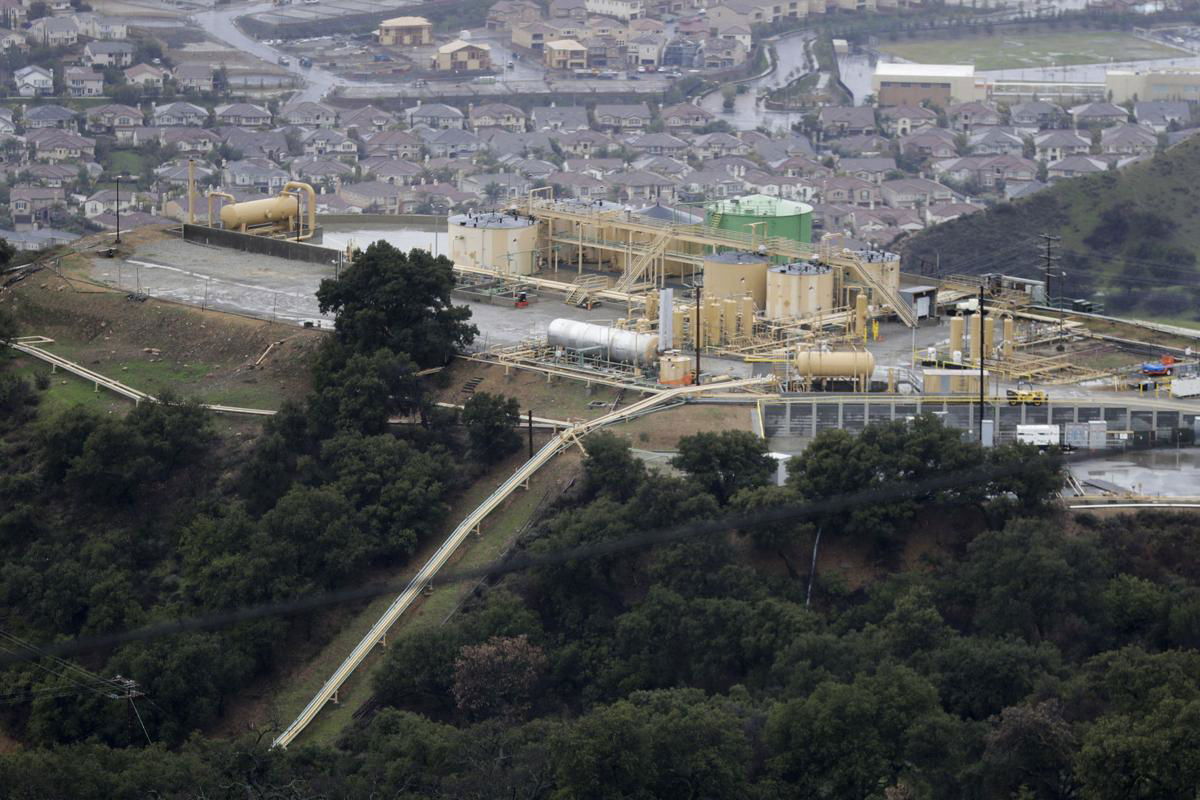
A state appeals court panel ruled Tuesday that Porter Ranch-area residents affected by the 2015-16 Aliso Canyon natural gas leak can seek restitution from Southern California Gas Co., but only stemming from the company’s delay in reporting the leak to state regulators.
The three-judge panel of the 2nd District Court of Appeal remanded the issue to a Los Angeles Superior Court judge for a hearing on “whether petitioners can prove damages from the three-day delay in reporting the leak, as charged in the criminal complaint.”
Southern California Gas Co. pleaded no contest in September 2016 to a misdemeanor count of failing to immediately report the gas leak, which began Oct. 23, 2015, and wasn’t capped until mid-February 2016. Three other misdemeanor charges — one count of discharging air contaminants and two more counts of failing to report the release of hazardous materials — were dismissed as part of the deal.
At the sentencing hearing in November 2016, some residents complained that they were left out of the settlement talks between prosecutors and SoCalGas, and they were left unable to seek restitution.
Residents initially took their case to a Superior Court appellate panel, to no avail, then filed a petition with the state appeals court.
In its ruling, the appeals court said Porter Ranch-area residents affected by the leak should be granted a new hearing with the original trial court on restitution “for damages caused only by the three-day delay in reporting the leak.” Residents cannot seek restitution stemming from any criminal charges against SoCalGas that were dismissed, including the release of contaminants into the air, the court ruled.
The trial court “did not fail in its duty when it refused to order restitution for all losses caused by the gas leak,” the appeals court panel ruled. “We reject the contention that the release of air contaminants was `encompassed in’ the reporting failure of which defendant was convicted. We also decline to extend the right to restitution to dismissed charges that are ‘transactionally related’ to the crime of which the defendant was convicted.”
Despite the limited nature of the ruling, attorneys for Porter Ranch-area residents hailed the decision.
“SoCalGas pleaded no contest to failing to report the gas leak. It is only right that victims receive restitution to the crime SoCalGas is guilty of committing,” attorney R. Rex Parris said.
Attorney Brian Panish added, “This is a very important victory for our clients as it allows them to present their losses to the trial court.”
SoCalGas spokesman Chris Gilbride said the company is confident a judge will again determine there is no basis for restitution based solely on the issue of the reporting delay.
“The California Court of Appeal unanimously upheld the trial court’s order denying petitioners’ claim for restitution based on the 2015 Aliso Canyon gas leak,” Gilbride said. “But because the scope of the original hearing in the trial court was unclear, the appellate court remanded for the trial court to consider solely `what, if any damages were caused only by the three-day delay in reporting the leak.’ We are confident the trial court will find, as it did before, that petitioners are not entitled to restitution based on a three- day reporting delay.”
Under its $4 million settlement agreement with prosecutors, SoCalGas was required to install and maintain an infrared methane monitoring system at the Aliso Canyon site — estimated to cost between $1.2 million and $1.5 million — and to retain an outside company to test and certify that the monitoring system and real-time pressure monitors to be placed at each gas well are working properly.
The agreement also mandated the hiring of a half-dozen full-time employees to operate and maintain the new leak-detection systems 24 hours a day at a cost of about $2.25 million over three years.
The agreement also called for the company to revise and adopt new reporting policies for actual and threatened releases of hazardous materials to the appropriate agencies, and mandated training courses on proper notification procedures for all of the utility’s employees who work at natural gas storage facilities within Los Angeles County.
The Aliso Canyon gas leak spewed more than 100,000 tons of methane into the air, making it the largest methane leak in U.S. history.
Health concerns stemming from the gas leak prompted thousands of residents to move out of the area into temporary housing at the expense of the Gas Co.